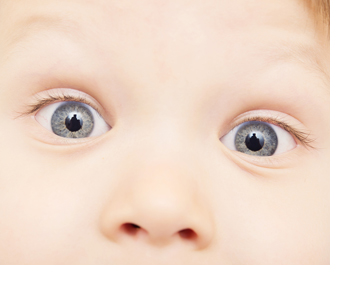
Element of Surprise Helps Babies Learn
April 2, 2015—Infants have innate knowledge about the world and when their expectations are defied, they learn best, researchers at Johns Hopkins University found.
In a paper to be published April 3 in the journal Science, cognitive psychologists Aimee E. Stahl and Lisa Feigenson demonstrate for the first time that babies learn new things by leveraging the core information they are born with. When something surprises a baby, like an object not behaving the way a baby expects it to, the baby not only focuses on that object, but ultimately learns more about it than from a similar yet predictable object.
"For young learners, the world is an incredibly complex place filled with dynamic stimuli. How do learners know what to focus on and learn more about, and what to ignore? Our research suggests that infants use what they already know about the world to form predictions. When these predictions are shown to be wrong, infants use this as a special opportunity for learning," said Feigenson, a professor of psychological and brain sciences in the university's Krieger School of Arts and Sciences. "When babies are surprised, they learn much better, as though they are taking the occasion to try to figure something out about their world."
The two researchers' study involved four experiments with preverbal 11-month-old babies, designed to determine whether babies learned more effectively about objects that defied their expectations. If they did, researchers wondered if babies would also seek out more information about surprising objects and if this exploration meant babies were trying to find explanations for the objects' strange behavior.
First the researchers showed the babies both surprising and predictable situations regarding an object. For instance, one group of infants saw a ball roll down a ramp and appear to be stopped by a wall in its path. Another group saw the ball roll down the ramp and appear to pass—as if by magic—right through the wall.
When the researchers gave the babies new information about the surprising ball, the babies learned significantly better. In fact, the infants showed no evidence of learning about the predictable ball. Furthermore, the researchers found that the babies chose to explore the ball that had defied their expectations, even more than toys that were brand new but had not done anything surprising.
The researchers found that the babies didn't just learn more about surprising objects—they wanted to understand them. For instance, when the babies saw the surprising event in which the ball appeared to pass through the wall, they tested the ball's solidity by banging it on the table. But when babies saw a different surprising event, in which the ball appeared to hover in midair, they tested the ball's gravity by dropping it onto the floor. These results suggest that babies were testing specific hypotheses about the objects' surprising behavior.
"The infants' behaviors are not merely reflexive responses to the novelty of surprising outcomes, but instead reflect deeper attempts to learn about aspects of the world that failed to accord with expectations," said Stahl, the paper's lead author and a doctoral student in psychological and brain sciences.
"Infants are not only equipped with core knowledge about fundamental aspects of the world, but from early in their lives, they harness this knowledge to empower new learning."
JILL ROSEN
ARTICLE:
"Observing the unexpected enhances infants’ learning and exploration," Aimee E. Stahl, Lisa Feigenson. Science, 3 April 2015: Vol. 348 no. 6230 pp. 91-94, DOI: 10.1126/science.aaa3799.
